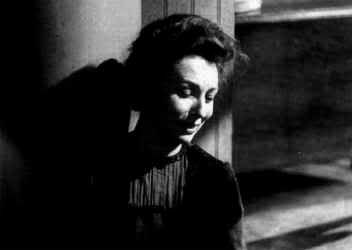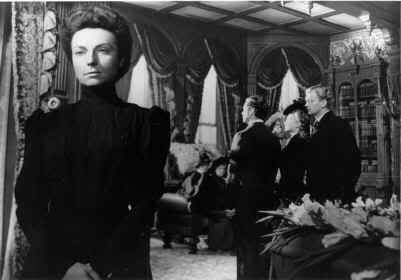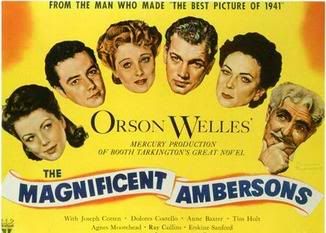StinkyLulu sorta hated Agnes Moorehead's performance in The Magnificent Ambersons.
G'head. Boo. Throw fruit. Click away. Do what you need to do. Lu wont' take it personal.
Ambersons itself is legendary, even notorious for its fractured brilliance. Ostensibly the tale of a neo-aristocratic family's decline amidst the social/economic upheavals of the industrial revolution, Welles' film becomes nearly Greek in its tragic scale, with the hubris of the story's putative protagonist instigating not only his own but his entire family's decline. A chorus of townspeople narrate the exposition & an omniscient narrator (Welles' own lugubrious baritone) intones: "Everyone waited for the day that George Amberson Minafer would get his comeuppance."
Agnes Moorehead plays Fanny Minafer, the unmarried aunt/sister/daughter/friend in the constellation of characters that inhabits the narrative of Georgie's comeuppance. Moorehead's Fanny (!) embodies the monstrosity of Victorian spinsterhood, the delicacy of girlishness ossified into a horror of unrealized womanhood. It's a shocking, brave & bold performance -- yet, also, nearly incoherent as it appears in the versions of the film that survive today. This incoherence in Moorehead's performance tracks two clumsy paths, one abundantly clear & one hidden between the scenes.
First, the palpably formidable Moorehead seems curiously cast as the flibbertigibbet here. Just listen to the voice. The power of Moorehead's sonorous gong of voice annoyingly channeled into affected chirps & breathless, lilting cascades. (Yes, that's the character, but.) And while Welles clearly loved filming Moorehead's improbably angled face (its beauty & severity stunning in abrupt turns), Welles' camera & lights swoop & circle & buzz even Moorehead's simplest scenes. So much technical tapdancing -- vocally & cinematically -- happens around & during Fanny. (Think of that stupidly overdone scene with her & George, the one where Fanny chatters manically in George's face, while they both rush through 3 or so rooms, all in close-up & in profile & in a single take.) Through it all, the clarity and coherence of Moorehead's performance gets lost amidst the apparatus of so many bells and whistles.

"It's nobody but old Fanny so I'll kick her."
Only in the famous "boiler scene" (above) is Moorehead/Fanny truly allowed to hold the screen. (And this scene alone warrants the Oscar nod, even the prize perhaps.) But it also suggests how the film's Studio-mandated edits (nearly one-third of the movie was cut at the behest of Studio execs) mangled Moorehead's performance. Between the frames of this film, it seems that Welles might well have staged Fanny as Lady to Georgie's Macbeth. Together, their misguided aspirations stunt and deform them both with strange synergy. Many of the known missing scenes (as below) feature Fanny centrally. But where Robert Wise's edits retained as protagonist contract-player Tim Holt's constipated Georgie, the changes to Moorehead's performance effectively relegate her to 3rd female when there's plenty to suggest Fanny might/well/should have been the dramatic female lead.

Production still capturing a crucial lost Fanny scene -- via Ambersons.com.
The biggest loss, it seems, among the storied tragedies of Welles' production is perhaps Agnes Moorehead's performance. Hers is clearly a great performance edited to shreds. Sadly, though, the tatters that remain of Moorehead's work -- garish incoherence, overwrought technique, filmic miscasting -- overwhelm the glimpses of genuine genius buried beneath. Certainly, and for decades, film freaks especially have correctly caught the whiff of greatness here. But. (And, golly, it hurts Lulu's heart to say this -- it's wierd how much.) But such greatness is glimpsed and not contained within the performance actually conveyed by the surviving prints of this film. Lulu can sense the amazingness, feel it, almost taste it -- but it's just not there to StinkyLulu's simple eyes. Sorry. (But Lulu'll keep coming back to see if the beloved greatness of Moorehead's Fanny appears in future viewings -- that's a promise.)



4 comments:
Just as a slight argument (though I can see where you are coming from in this, and I haven't viewed the film since 1991): Do you think perhaps Moorehead's voice is actually on purpose--that it is the containing of the powerful presence Moorehead is in the ridiculousness of Victorian Spinsterhood? That perhaps, if we would see the entire performance, her actual power repressed into the shrinking violet that she is acting would only illuminate the forced nature of the performance the character is supposed to be giving? That perhaps those things that seem counter-intuitive in her casting are there to remind us how ridiculous and performative the character herself is--forced to play a role in life that is obviously constraining? And the absolute wierdness of the perf is actually supposed to make us go WTF? Why is this woman acting this way? I think you touched on this, so you may be saying "uh, yeah, duh."
And I do think you're right--this is famously Welles most ambitious and messy picture, and it would be wonderful to see what it would have been like had we been able to see what he actually wanted. Perhaps then what seems over the top may have actually serviced an incredible vision. But who knows? But how fabulous is that opening tracking shot?
Totally -- the vocal choice is conspicuously a "choice" made by both the character & the actress -- I just think it's a wrong choice, because it works against her actual vocality. It's the kind of thing that might have worked on stage but the sensitivity of the film soundtrack amplified the vocal breaks in a way that didn't serve the performance. It's a picky thing. But.
I'm also now convinced that Fanny was the female lead, in a Best Actress way, & that the studio edited her actual performance out. I believe there was a great performance given -- I just haven't seen it in the version of the film available to us.
Yet folks just LOVE it... So, I'm off sitting in my own little corner. (I'd also best not talk about tracking shots & Welles...)
That makes complete sense with the theatre background with all of them. It would have been amazing to see them as the Mercury Theater and see what they could do. And yeah, Welles went a little crazy. Though I did see the re-cut of Touch of Evil recently, and the loopiness worked--even though Dennis Weaver was insane, and Charlton Heston was in dark make-up.
I've always felt the same way, the elements of a terrific performance are there, but never fully realized.
Post a Comment